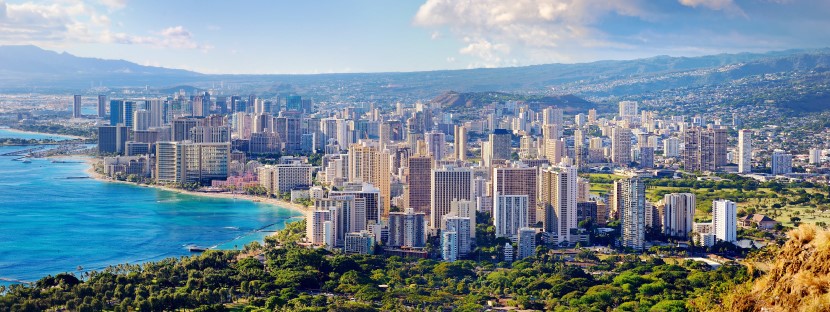
In Honolulu, the capital of Hawaii, offering short-term rentals of under 30 days violates the law for all but a few lucky homeowners who obtained Non-Conforming Use Certificates (NCUs) back in the 1980s, plus a few owners of resort-owned condo units.
Despite the prohibition, the large number of tourists who seek relief when visiting this high-priced island have encouraged homeowners to risk illegal short term rentals; especially in neighborhoods along the North Shore, and among those not licensed as a TVU (Transient Vacation Unit). While thousands of rentals operate illegally, there were only 789 active TVUs and 33 active BB certificates on all of Oahu, mostly near Waikiki.
Transient vacation occupants pose problems in neighborhoods – such as fire safety, traffic and parking problems, noise, and security. The state was also concerned that vacation rental owners were not paying their fair share of taxes. A 2016 bill that requires owners to pay a 4% General Excise Tax (GET) and a 9.25% Transient Accommodation Tax (TAT) and list Hawaii State Tax ID on temporary vacation rental sites like Airbnb. Passage of the tax law made short-term rentals, at least temporarily, legal on the island for properties licensed as TVUs.
The same bill also allocated more funds for local government staff to investigate and shut down illegal vacation rentals; more than 50 were shut down by early 2017. The government is hoping this will discourage property owners from offering their real estate as vacation rentals and encourage them to convert to long term rentals, providing a much-needed solution to the housing shortage on the island.
Current Thinking On Short Term Rentals on Oahu
Lawmakers on the island and at state level, are studying the impact of short-term rentals in Hawaii. Given the very real need for affordable vacation rentals, the issue is far from solved. Some state senators want to penalize anyone who operates in illegal short-term rentals with a class C felony conviction which is comparable to the penalty for third degree sexual assault, second-degree theft, and illegal possession and use of explosives. This seems excessive, but it also demonstrates how serious they consider illegal subletting.
Others regard it as foolish to turn law-abiding homeowners into criminals for offering property for rent when the state offers no legal permits to those able to accommodate the increased demand for vacation rentals. Airbnb lines up on the latter side of the argument as it works to convince local officials that it should remain part of the solution in Honolulu.
As Emily Cullem, a spokeswoman for the Travel Technology Association, a trade association that advocates for innovative, web-based travel solutions, puts it, “…Hawaii should develop 21st century public policy that recognizes the rapidly increasing consumer demand for short-term rentals and their role in the overall tourism marketplace.”
Sites like Airbnb still offer many illegal short-term rentals which can put vacationers at risk of finding themselves without lodging if their rental gets shut down. It is recommended that smart travelers should regularly check a City of Honolulu report for authorized rental properties. Smart property owners should establish a system to monitor for Airbnb sublets.
